Related Research Articles

The Bee Gees Sing and Play 14 Barry Gibb Songs is the debut studio album by the Bee Gees. Credited to Barry Gibb and the Bee Gees, it was released in November 1965 on the Australian Leedon label. It is largely a compilation of most of the Gibb brothers' singles that had been released over the previous three years in Australia, which accounts for the many different styles of music on it.
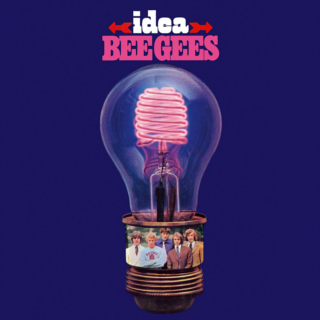
Idea is the fifth album by the Bee Gees. Released in September 1968, the album sold over a million copies worldwide. The album was issued in both mono and stereo pressings in the UK. The artwork on the Polydor release designed by Wolfgang Heilemann featured a "beehive" neon lightbulb with a group photo in its base, while the North American ATCO release designed by Klaus Voormann featured a composite head made from each band member. It was their third internationally released album – the first two albums being released only in the Australian market.
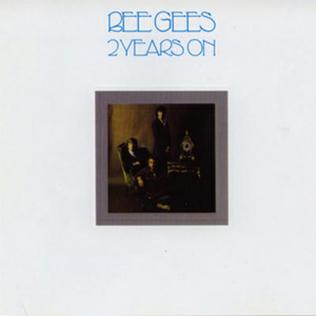
2 Years On is the eighth studio album by the Bee Gees, which reached No. 32 on the US charts. Released in 1970, the album saw the return of Robin Gibb to the group after an earlier disagreement and subsequent split following Odessa. 2 Years On was the first album with drummer Geoff Bridgford, who remained a full-time member of the group until 1972 although he was not pictured on the sleeve. The best-known track is "Lonely Days". Released as the first single by the reunited brothers, it charted high in the US, but peaked at No. 33 in the United Kingdom.

"I.O.I.O." is a song by the Bee Gees, released on the album Cucumber Castle. It was written by Barry and Maurice Gibb. The song was released as a single in March 1970, and was also one of the highlights of the album. The single was a relative success mainly on European charts. Its music video is taken from the film Cucumber Castle.
"Melody Fair" is a song by the Bee Gees, written by Barry, Robin & Maurice Gibb in 1968 and released in 1969 on their album Odessa. It was not released as a single, but this song was played on many radio stations, and was a hit in Japan. Andy Gibb's 1974 group, named Melody Fayre was named after this song. It also featured as the theme to Melody, a British film featuring a number of Bee Gees songs in its soundtrack.
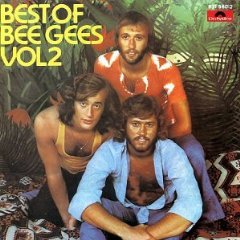
Best of Bee Gees Vol. 2 is a compilation album of hits by the Bee Gees released in 1973. The album, briefly revived on CD in the late 1980s, went out of print, but was reissued by Rhino in November 2008.
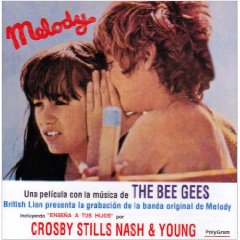
Melody is the soundtrack album for the film Melody. It was released in 1971 and is performed by the Bee Gees, Crosby, Stills, Nash & Young, and Barry Howard of The Aces, Desmond Dekker's backing group. It reached No. 1 on the Japanese charts. "In the Morning" was first recorded in 1965 by The Bee Gees, and was re-recorded in 1970 for the film; its title was changed to "Morning of My Life", though the song is credited under its original title on the album. The songs "Melody Fair", "First of May", and "Give Your Best" were originally released on The Bee Gees' 1969 album Odessa.

"Peace of Mind" is a song by the Bee Gees, released in Australia in March 1964 as their third single, backed with "Don't Say Goodbye".

Come Saturday Morning was an LP album featuring The Sandpipers, released by A&M Records in August 1970. The album reached #96 on the Billboard charts.

"Let There Be Love" is a dramatic ballad by the Bee Gees, written by Barry, Robin and Maurice Gibb and released as the opening track on their 1968 album Idea. In 1970 it was issued as a single in the Netherlands, peaking at no. 14 in March during a four-week chart run. In 1968 the group performed (lip-synced) the song on a European TV station, and the clip has been played on 192TV in the Netherlands.

Robin's Reign is the first solo album by British singer Robin Gibb, a member of the Bee Gees with his brothers Barry and Maurice. Robin had left the group following a disagreement with his brother Barry over who should sing lead vocals. The album was not a commercial success, though it did spawn Gibb's solo hit, "Saved by the Bell". The other songs in the album were produced by Gibb, and the rest was produced with his manager, Vic Lewis. This album was reissued by RSO Records in 1978 and reissued in 1991 on Spectrum Records. The album had a limited CD release in Germany and was made available digitally on Amazon and Spotify in 2011 and iTunes the following year. Gibb would not release another solo album until 1983.
"Bury Me Down By the River" is a song written by Barry and Maurice Gibb and recorded separately by the Bee Gees and P.P. Arnold. The Bee Gees' version was recorded in May 1969 at IBC Studios and released in April 1970 on the album Cucumber Castle.
"Odessa (City on the Black Sea)" is a song by the English rock band the Bee Gees, written by Barry, Robin & Maurice Gibb in 1968 and released in early 1969. The song opened the album of the same name. The song was recorded twice. The first version of the song (without the orchestra) was later to appear on Sketches for Odessa and has a duration to 6:40. The song was about the survivor of a shipwreck, and was originally intended to form the basis of the whole album. Musically it was dominated by strings and acoustic guitar. It was originally proposed to be the first single of the album.
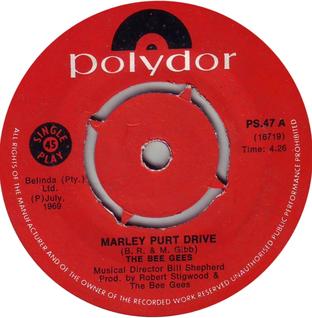
"Marley Purt Drive" is a song recorded by the Bee Gees, It was written by Barry, Robin & Maurice Gibb and released in March 1969 on the album Odessa. It was released in stereo in the United States in January and its mono version was released in the United Kingdom in March. The remastered version of this song was released on 27 February 2009 on Reprise Records.
"Black Diamond" is a song by the Bee Gees released on the album Odessa in 1969. The song was written by Barry, Robin & Maurice Gibb and featured lead vocals by Robin Gibb. It was included on the compilation Marley Purt Drive released in 1970.

"Country Woman" is a song written and released by British rock band Bee Gees. It was written and performed solely by Maurice Gibb, and released as a B-side of "How Can You Mend a Broken Heart", which was the group's first US No. 1. The songs were released as a double A-side in Germany, France, Japan and Canada.
"I Laugh in Your Face" is a ballad performed by the Bee Gees, written by Barry, Robin & Maurice Gibb and released in March 1969 on the album Odessa. Most of the vocals are performed by Barry Gibb except for a short central section sung by Robin Gibb. It was recorded on July 12, 1968. the same day as the band recorded their hit song "I've Gotta Get a Message to You". The mono mix made at this time, when it was presumably intended as the B-side of "Message", was released in 2009 on the Sketches for Odessa disc that accompanied the remastered edition of the album. Its demo version, recorded the same day, also featured on the Sketches disc.
"Never Say Never Again" is a song by the Bee Gees, It was written by Barry, Robin & Maurice Gibb in 1968 and released on the album Odessa in 1969.

"Lamplight" is a song by the Bee Gees, released as the B-side of "First of May", but featured as the single's A-side in Germany. It also featured on their double album Odessa in March 1969. The song was written and composed by Barry, Robin & Maurice Gibb and featured lead vocals by Robin Gibb. No other singles were released from the album, and the fact that the group's manager Robert Stigwood chose "First of May", which only featured Barry Gibb's voice for the A-side, that caused Robin to quit the group.
"Sweetheart" is a song released by the Bee Gees, released as the B-side of "I.O.I.O." in March 1970. and released on the album Cucumber Castle in April 1970.
References
- ↑ Joseph Brennan. "Gibb Songs: 1968".
- ↑ Discogs.com (1970). "Etta James - Etta James Sings Funk". Discogs .
- ↑ "Etta James – When I Stop Dreaming / Sound Of Love". Discogs. 1970. Retrieved 24 May 2013.
- ↑ Discogs.com (1970). "The Sandpipers - Come Saturday Morning". Discogs .